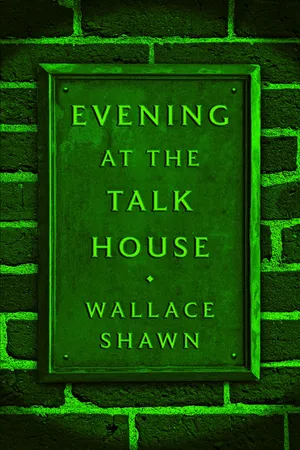The central meeting room of The Talk House, an old-fashioned, understated small club. Several armchairs, some facing away from us. There is a bar, with various bottles, where guests can refill their drinks. Robert is a tall, attractive man, perhaps in his sixties.
ROBERT
I got a call from Ted the other night. That was a surprise. It had probably been five or six years since I’d heard from Ted. Of course, I’d never really— Well, I was about to say I’d never really known Ted that well—but then who have I known well, when you get right down to it, come to think of it?—so I guess I won’t say that. To “know someone well”—I mean, that’s a phrase from another time. That’s an idiotic phrase. Who have I known well? I haven’t known anyone well. But at any rate, Ted, you see, had composed some incidental music for a play I’d written a dozen years ago or so called Midnight in a Clearing with Moon and Stars—quite nice music, actually—and at that time, you see, when theater played a somewhat larger part in the life of our city than it does now, Ted had been rather successful, he drove a rather nice car, he wore some pretty good-looking jackets and shirts, he was doing all right, but as far as I’d heard, his fortunes had declined, so it was in a way rather touching that he wanted to gather together some of the old gang from Midnight, as we called it, to commemorate the tenth anniversary of its opening night, a date I myself would never otherwise have noticed. You see, according to Ted, that play had apparently been a very happy experience for all concerned. I mean, that’s what he said, and it was nice to hear that, I guess, and I suppose I’d had a nice time, myself, relatively speaking, during the production of that play. Certainly it would be reasonable to call it, from many points of view, my best play, if one bothers to get involved in those invidious comparisons.
Like all my plays, Midnight was set in a period that to a lot of people seemed vaguely medieval, but I always explained that really most of my plays took place in a sort of imaginary kingdom that predated history altogether or stood to one side of it, at any rate. Midnight in a Clearing with Moon and Stars told the story of a powerful king, his loyal sons, and a princess, but actually the central figure was a sort of independent knight who lived in an enormous forest quite near the area ruled over by the king. Well—in any case, the play hadn’t been terribly well liked by the public, and it wasn’t a success, but quite a few people had enjoyed it quite a bit, including, interestingly, a certain Mr. Ackerley, who not long afterwards began to take a more and more prominent place in our national life, which, I’d have to admit, was not unhelpful to me when certain lovely prizes were awarded several years later, after I’d moved into the more congenial form of writing that sustains me today. Of course there are quite a few people who look back lovingly and longingly on the era of Walter Barclay in which that play was written, but you can put me down as a bit of a skeptic on that. I mean, was that really such a happy time? I’m not so sure. Certainly we can all agree that Walter Barclay was a very nice fellow, and Mr. Ackerley, as we know, has a cruel side, more and more in evidence, one could say, but how do these personal traits translate themselves into nation-wide happiness or unhappiness, or do they, you see? I think that’s the question that’s sometimes ignored. Mind you, I keep my views of Ackerley to myself, as most people obviously do if they have any brains. Walls have ears—as do floors, ceilings, windows, doors, plates, cups, spoons, forks, and come to think of it, other human beings, if we’re compiling a list. In any case, the alternation between Mr. Ackerley and our sneaky friend Mr. Rodman seems to work rather well, I feel, and I’m certainly not going to complain because statistics say that the theatergoing impulse has declined substantially since Walter Barclay took his last breath—or had it taken from him, if you believe those theories. A decline in the theatergoing impulse could in a way be seen as a small price to pay for the rather substantial benefit derived from entering into an era that quite a few people would describe as much more tranquil and much more agreeable than the one that preceded it. And the horrible truth, if I dare to say this, is that although I had some fairly nice times, some pretty good moments, putting on my plays—well, if pressed to the wall, I’d have to say that theater for me eventually came to seem like a rather narrow corner, a rather distasteful little corner of the world in which to spend my life—I came to feel that it was a corner of the world that I honestly wouldn’t mind leaving and whose general decline I was not in my heart of hearts terribly saddened about. Because, what exactly was “theater,” really, when you actually thought about it? You’d have to say that it was utterly and irreducibly about a small group of humans sitting and staring at another small group of humans—an animal process—an animal process that completely lacked art, not to mention, for my money, charm, and that was fund...
